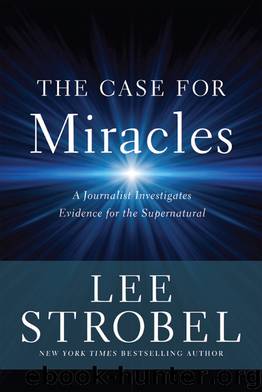The Case for Miracles by Lee Strobel

Author:Lee Strobel
Language: eng
Format: epub, mobi
Publisher: Zondervan
Published: 2018-02-26T05:00:00+00:00
I asked Strauss, “What’s your assessment of the kalam argument?”
“It’s extremely strong,” he said. “Think about it: Is there anything that comes into existence without a cause behind it? Some scientists say there may be uncaused quantum events, but I think there are good reasons to be skeptical about that.15 And we know from the evidence that the universe did come into existence. If those two premises of the argument are true, then the conclusion inexorably follows: the universe has a cause.”
I said, “Some skeptics, including the late astronomer Carl Sagan, suggest there might be merit to the idea of an oscillating universe, where the universe expands, then crunches back down, and then expands again—on for infinity, without a beginning. Is there evidence to back this up?”
“Not really. Entropy, which is roughly the amount of disorder, would continue to increase from one cycle to the next, meaning each succeeding oscillation would get bigger and bigger. Run the tape backward, and you get smaller and smaller oscillations, until you get to a beginning,” Strauss responded. “Besides, this would require that ‘dark energy,’ which scientists suspect is accelerating the expansion of the universe, would suddenly reverse itself and cause the universe to collapse. That’s stretching things beyond credulity.”
I said, “Others propose that the universe simply popped out of nothing, from the quantum foam fluctuations of empty space. Make sense?”
“Quantum foam is the space-time fabric of the universe. It’s not nothing. So if the universe popped out of it, where did the quantum foam come from? You’d have to account for that. Now, quantum fluctuations do allow brief periods of time when virtual particles pop into existence—caused by quantum energy—and then go back out of existence.”
“What’s the time scale?”
“Trillionths of a second,” he said. “So to postulate that something which happens in a trillionth of a second could create an entire universe that lasts billions of years is an extrapolation that seems extremely unreasonable to me. I’ll be honest: if this wasn’t a way to try to get around God, nobody would have ever thought of it, in my opinion.”
“In my interview, the skeptic Michael Shermer said the best answer to how the universe originated is simply, ‘We don’t know.’ He suggested there might be other possible explanations than ‘God did it.’”
“Look, we don’t live our lives based on obscure possibilities; we live our lives based on probabilities. Is it possible my wife poisoned my cereal this morning? Anything is possible, but not everything is probable,” he replied. “The real question is: Given what we observe with the universe, what’s the highest probability? Everything tells us there was a real beginning. Everything else is a mere possibility, with no observational or experimental evidence to back it up.”
Craig came to a similar conclusion. “In a sense, the history of twentieth-century cosmology can be seen as a series of one failed attempt after another to avoid the absolute beginning predicted by the standard big bang model,” he wrote. “This parade of failed theories only serves to confirm the prediction of the standard model that the universe began to exist.
Download
This site does not store any files on its server. We only index and link to content provided by other sites. Please contact the content providers to delete copyright contents if any and email us, we'll remove relevant links or contents immediately.
The Hatha Yoga Pradipika (Translated) by Svatmarama(2481)
Real Sex by Lauren F. Winner(2474)
The Holy Spirit by Billy Graham(2413)
The Secret Power of Speaking God's Word by Joyce Meyer(2251)
The Gnostic Gospels by Pagels Elaine(2026)
Devil, The by Almond Philip C(1898)
23:27 by H. L. Roberts(1891)
Jesus by Paul Johnson(1887)
The Nativity by Geza Vermes(1847)
All Things New by John Eldredge(1780)
Chosen by God by R. C. Sproul(1758)
Angels of God: The Bible, the Church and the Heavenly Hosts by Mike Aquilina(1627)
The Return of the Gods by Erich von Daniken(1571)
Angels by Billy Graham(1548)
Evidence of the Afterlife by Jeffrey Long(1457)
Knowing God by J.I. Packer(1430)
The Gnostic Gospel of St. Thomas by Tau Malachi(1411)
Victorian Sensation by James A. Secord(1404)
How To Be Born Again by Billy Graham(1403)
